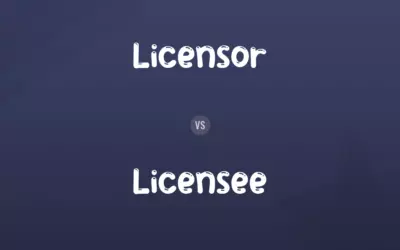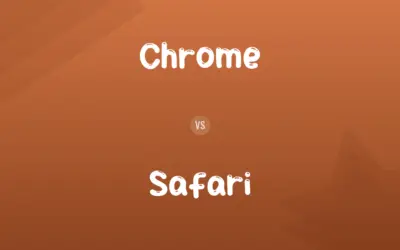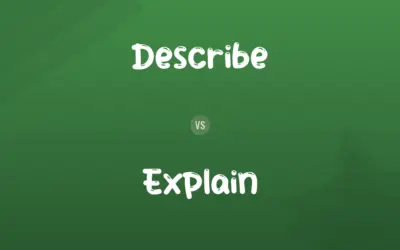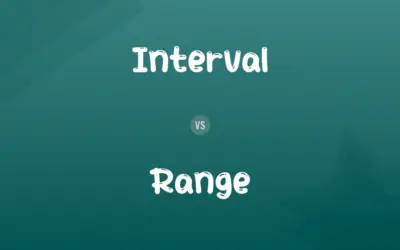Ourself vs. Ourselves: Difference and Comparison
Edited by Muazma Batool — By Muneeza Rehman — Updated on September 22, 2023
"Ourself" is a reflective pronoun used when "we" refers to one entity; "ourselves" is used when "we" refers to multiple entities, emphasizing all individuals in the group.
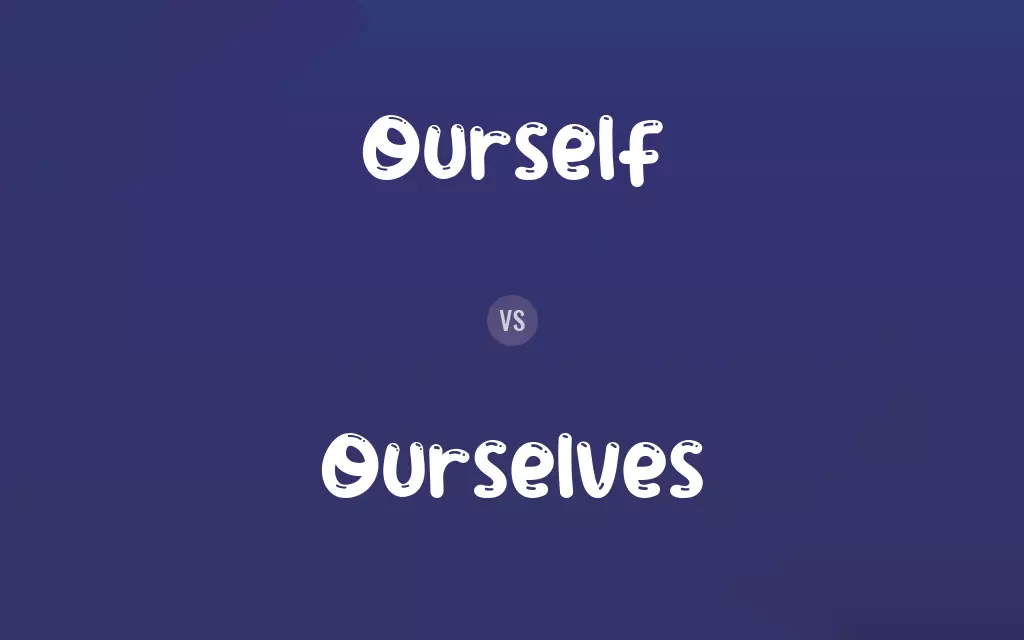
Difference Between Ourself and Ourselves
Ourself and ourselves are reflexive pronouns, but they have different uses in English grammar. The word "ourself" is used when "we" refers to a singular entity, such as a company or a monarch representing an organization or a realm. This word is suitable when referring to a single entity or unit that comprises more than one person but acts as one. On the other hand, "ourselves" is used when "we" refers to two or more people acting individually within the group. This distinction is critical to maintaining grammatical accuracy and clarity in expression.
Muazma Batool
Sep 22, 2023
Understanding the proper context in which to use "ourself" versus "ourselves" is essential for correct grammatical construction. "Ourself" is usually appropriate in formal contexts where a single entity, like a corporation or a group, is acting in unity, representing a collective action or thought. "Ourselves," being the plural form, is used when the actions or feelings are shared but are of individual origins within a group, emphasizing the separate entities performing the action.
Muneeza Rehman
Sep 22, 2023
The selection between "ourself" and "ourselves" impacts the overall meaning of the sentence. Using "ourself" implies a unified, collective action or feeling by a single entity comprised of multiple individuals, like a team or a company. Conversely, using "ourselves" implies that each individual within a group is performing the action or experiencing the feeling independently, reflecting the autonomy of the individuals within the collective.
Muazma Batool
Sep 22, 2023
While both "ourself" and "ourselves" serve to emphasize the subject of a sentence, it is vital to discern their proper usage based on the number and unity of the entities involved. "Ourself" is the reflexive form used for singular, collective entities, conveying unity and collective action or feeling. In contrast, "ourselves" is appropriate for plural entities, emphasizing the individuality and separate actions or feelings of the people within a group.
Nolan
Sep 22, 2023
Ourself vs. Ourselves Comparison Chart
Represents
One entity, such as a company or monarch, comprised of multiple individuals
Multiple individuals within a group
Muazma Batool
Sep 22, 2023
Usage Context
Formal, where a single entity acts as one
When each individual in a group acts or feels independently
Muneeza Rehman
Sep 22, 2023
Emphasis
On the unity and collective action or feeling of a single entity
On the individual actions or feelings of people within a group
Levi
Sep 22, 2023
Grammatical Requirement
When "we" refers to a single, collective entity
When "we" refers to multiple, individual entities
William
Sep 22, 2023
Ourself vs. Ourselves Definitions
◉Ourself
Ourself is used when "we" refers to a singular entity, like a monarch.
We, the monarch, must conduct ourself with dignity.
Muneeza Rehman
Sep 22, 2023
◉Ourselves
Ourselves is used to emphasize individual actions within a group.
We all prepared ourselves for the impending storm.
Levi
Sep 22, 2023
◉Ourself
Ourself is suitable for formal contexts representing unified action or thought.
We, the council, have decided to express ourself clearly on this matter.
William
Sep 22, 2023
◉Ourselves
Ourselves reflects the individual feelings of people within a group.
We expressed ourselves openly in the group discussion.
Muneeza Rehman
Sep 22, 2023
◉Ourself
Ourself emphasizes the action of a singular entity representing a collective.
We, as a company, must present ourself professionally.
Muazma Batool
Sep 22, 2023
◉Ourselves
Ourselves is used when "we" represents more than one individual entity.
We must brace ourselves for the challenges ahead.
Muneeza Rehman
Sep 22, 2023
◉Ourself
Ourself conveys a collective feeling or action by one entity comprised of multiple individuals.
We, the team, must prepare ourself for the upcoming challenges.
Jonathan
Sep 22, 2023
◉Ourselves
Ourselves is plural and indicates actions or feelings of multiple entities.
We can teach ourselves to learn new skills.
Kaitlyn
Sep 22, 2023
◉Ourself
Ourself is used to emphasize the subject, a singular entity, in a sentence.
We, the organization, have aligned ourself with this mission.
Jonathan
Sep 22, 2023
◉Ourselves
Ourselves emphasizes the subject of a sentence when referring to multiple individuals.
We must push ourselves to achieve our goals.
Muazma Batool
Sep 22, 2023
◉Ourself
(reflexive pronoun) royal]] or editorial we: myself (as used by a monarch, writer or speaker who is referring to themself as we).
In the present study, we will limit ourself to the simplest of cases.
Muneeza Rehman
May 03, 2023
◉Ourselves
An emphasized form of the pronoun of the first person plural; - used as a subject, usually with we; also, alone in the predicate, in the nominative or the objective case.
We ourselves might distinctly number in words a great deal further then we usually do.
Safe in ourselves, while on ourselves we stand.
Unless we would denude ourself of all force.
Muneeza Rehman
May 03, 2023
◉Ourself
(reflexive pronoun) The reflexive of the generic we: oneself.
We should love our neighbor as ourself.
Muneeza Rehman
May 03, 2023
◉Ourselves
(reflexive pronoun) Us; the group including the speaker as the object of a verb or preposition when that group also is the subject.
We should keep this for ourselves.
Muneeza Rehman
May 03, 2023
◉Ourselves
(emphatic) We; intensifies the subject as the group including the speaker, especially to indicate that no one else satisfies the predicate.
We did it ourselves.
Muneeza Rehman
May 03, 2023
Ourself vs. Ourselves Frequently Asked Questions
Should ourself be used to represent a company’s action?
Yes, ourself is appropriate to represent a company’s or any singular entity’s unified action or stance.
Muneeza Rehman
Sep 22, 2023
What does ourself refer to?
Ourself refers to a singular entity representing a collective, emphasizing unified action or feeling.
Muazma Batool
Sep 22, 2023
Is ourselves suitable for emphasizing individual actions within a group?
Yes, ourselves is suitable for emphasizing the individual, separate actions or feelings of people within a group.
Muazma Batool
Sep 22, 2023
Is ourself emphasizing the subject in a sentence?
Yes, ourself emphasizes the subject when it is a singular entity representing a collective.
Nolan
Sep 22, 2023
Is ourself used for singular entities?
Yes, ourself is used when "we" refers to a single, collective entity like a company or a monarch.
Muneeza Rehman
Sep 22, 2023
Is ourself formal and representative of collective thoughts?
Yes, ourself is usually formal and represents collective actions or thoughts of a singular entity.
Kaitlyn
Sep 22, 2023
What does ourselves represent?
Ourselves represents multiple individuals, emphasizing the separate actions or feelings within a group.
Muneeza Rehman
Sep 22, 2023
When should we use ourselves in a sentence?
Use ourselves when "we" refers to multiple individuals acting or feeling independently within a group.
Muneeza Rehman
Sep 22, 2023
Can ourselves convey individual feelings within a group?
Yes, ourselves conveys the individual feelings or actions of each person within a group.
Muneeza Rehman
Sep 22, 2023
Can ourselves be used to reflect individual autonomy within a collective?
Yes, ourselves is used to reflect the individual autonomy and actions of people within a collective.
Muneeza Rehman
Sep 22, 2023
Content Creators
Written by
Muneeza RehmanAt Comparisons.wiki, Muneeza skillfully navigates the vast sea of information, ensuring clarity and accuracy as the lead content editor. With a keen eye for detail, she curates every comparison to enlighten and engage readers.
Edited by
Muazma BatoolAs a content editor, Muazma Batool is not just a grammar guru but a creative mastermind who breathes life into every word. With an eagle eye for detail and a passion for storytelling, she transforms bland text into engaging content that captivates audiences and drives results.




